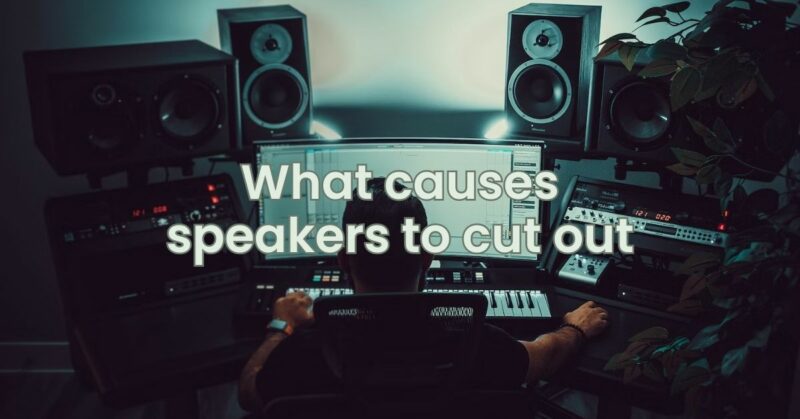Speakers are essential components in delivering high-quality audio experiences for various applications, including music, movies, and gaming. However, despite their robust design and functionality, speakers can occasionally encounter issues that lead to audio disruptions, such as cutting out or intermittent sound. Understanding the potential causes behind speakers cutting out can help users troubleshoot and address these problems effectively. In this article, we will explore the common reasons that cause speakers to cut out and offer insights into resolving these issues.
- Faulty Speaker Connections
Loose or damaged speaker connections are among the most frequent culprits of audio disruptions. When the connections between the amplifier or audio source and the speakers are not secure, the audio signal may not be consistently transmitted, resulting in sound cutouts or irregular audio playback. Check all cable connections and ensure they are snugly and properly plugged in.
- Speaker Wire Issues
Speaker wires play a crucial role in carrying the audio signal from the amplifier to the speakers. If the wires are damaged, frayed, or of poor quality, they can disrupt the signal transmission, leading to audio interruptions. Inspect the speaker wires for any visible damage and replace them with high-quality cables if necessary.
- Amplifier Problems
The amplifier acts as the powerhouse that drives the speakers and boosts the audio signal. If the amplifier is faulty, overheating, or overloaded, it may cause the speakers to cut out or produce distorted sound. Inspect the amplifier for any visible damage, ensure it has proper ventilation, and avoid exceeding its power limits.
- Impedance Mismatch
Impedance refers to the resistance that an electrical circuit presents to the flow of an alternating current (AC). Speakers have specific impedance ratings, and if they do not match the amplifier’s output impedance, it can lead to sound issues, including cutting out. Verify that the impedance of the speakers is compatible with the amplifier’s specifications.
- Wireless Connectivity Interference
Wireless speakers have become popular due to their convenience and clutter-free setup. However, they are susceptible to interference from other electronic devices, Wi-Fi signals, or Bluetooth devices, leading to audio disruptions. Place the wireless speakers away from potential interference sources or use devices operating on different frequencies.
- Audio Source Issues
Sometimes, the problem might not lie with the speakers or amplifier but with the audio source itself. Corrupted audio files, outdated drivers, or incompatible software can cause speakers to cut out. Update audio drivers and software to ensure seamless compatibility.
- Temperature and Humidity
Extreme temperature variations and high humidity levels can affect the integrity of speaker components and connections. Avoid placing speakers in direct sunlight or damp environments to prevent potential issues caused by environmental factors.
- Overheating
Extended periods of high-volume audio playback can cause speakers or amplifiers to overheat, leading to temporary or permanent damage. Allow the audio equipment to cool down periodically, and avoid consistently operating at maximum volume levels.
Conclusion
When speakers cut out or experience intermittent sound disruptions, it can be frustrating for users seeking an immersive audio experience. By understanding the potential causes behind these issues, users can troubleshoot and resolve them effectively. Start by checking the speaker connections and verifying the speaker wire quality. Ensure proper impedance matching between the speakers and the amplifier, and avoid potential interference in wireless setups. Keep the audio source and drivers up-to-date and avoid exposing the speakers to extreme temperature and humidity levels. Regular maintenance and care for audio equipment can help prevent and resolve audio disruptions, allowing users to enjoy uninterrupted and high-fidelity sound from their speakers. If the issue persists despite troubleshooting efforts, consider seeking assistance from a professional audio technician for further diagnosis and repair.


